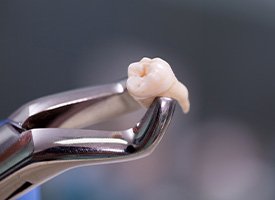Tooth Extractions – Pittsburgh, PA
Preserving the Health of Your Smile
Our team understands how scary it can be hearing that you need a tooth extraction in Pittsburgh. That’s why we’ll remain by your side along every step of the way, so you know exactly what to expect. We only recommend this treatment when we’ve exhausted all of our other treatment options to preserve the health of your mouth, because we always choose to treat and keep a natural tooth over extracting it whenever possible. Dr. Dan Rairigh, your dentist in Pittsburgh, has completed advanced training in sedation, so he focuses on providing each patient who is having an extraction with a relaxed, comfortable, and pain-free experience.
Signs a Tooth Extraction is Needed

A patient can need a tooth extraction for a variety of reasons and can experience several different symptoms before they decide to finally reach out to us. By the time someone requires this treatment, it’s important to act fast, to preserve remaining natural teeth and prevent the issue from spreading. Here are some problems that may need to be treated with a tooth extraction:
- You have a severe toothache.
- Your tooth is visibly damaged or decayed, and a filling won’t be able to repair it.
- You have a tooth infection and a root canal wasn’t able to cure it.
- Your teeth are crowded and there’s not enough room in your mouth to receive braces to align them.
- You have impacted teeth that won’t be able to healthily grow in.
- You have gum disease, and as a result, a tooth is loose.
At the first sight of any of these issues, it’s important to contact our office right away. We’ll provide you with a thorough examination to learn what issues you’re battling with and determine whether an extraction is the best course of action.
Types of Tooth Extractions

When you get to our office, we’ll conduct a visual examination as well as take X-ray images of your mouth if necessary. After we diagnose the problem, we’ll suggest one of the following tooth extraction plans.
Wisdom Tooth
Some people don’t have enough room in their mouth for their wisdom teeth, also known as the third molars. As they continue to grow, it can cause them to become stuck underneath the surface of the gums, increasing the risk of oral health problems such as misalignment, decay, and infection. As a preventive measure, we’ll often remove them before they begin to cause issues in your mouth.
Multiple Tooth
Patients who have suffered from dental trauma, severe decay, or even have certain genetic factors may require a multiple tooth extraction. In these cases, Dr. Rairigh will discuss the treatment with you as well as any restorative options to replace the gaps in your smile, such as dental implants or a fixed bridge.
Tips for a Fast Recovery

Following your procedure, we’ll provide you with some detailed post-operative care instructions to make sure that your mouth heals quickly and you experience minimal discomfort. We may recommend to:
- Rest for a couple of days.
- Eat a diet of soft food and avoid chewing on the side of your mouth where your extraction site is located.
- Don’t drink from a straw.
- Place a cold compress on your face to minimize swelling.
- Continue following your dental hygiene routine.
- Take any medications as instructed to ease any discomfort.
If you have any questions following your procedure, don’t hesitate to contact our office. Our team will be more than happy to provide you with additional tips and information to make sure you remain comfortable and heal without any complications.
Understanding the Cost of Tooth Extractions

While you may need tooth removal, you should still learn its price before you commit. You could end up getting a treatment you can’t afford otherwise, putting your finances at risk. Just note that you’ll need to see our dentists for an estimate; the cost of tooth extractions varies. Also, our team will strive to make your care affordable, walking you through its price factors, dental insurance, etc. Learn more relevant details by reading below or calling our office.
Factors That Can Affect Tooth Extraction Cost

At the initial consultation, our dentists will assess your tooth (or teeth). This step lets us check the factors that affect your extraction cost, including:
- Number of Extracted Teeth – As treatment removes more teeth, its cost will rise accordingly.
- Tooth Type/Location – In most cases, a tooth’s type or location also affects the price of its removal. One example is how removing front teeth is less costly due to being an easier process.
- Difficulty of Treatment – When tooth extraction is simple, it usually doesn’t cost that much. Meanwhile, a complex removal tends to be more expensive.
- Tooth Replacement Options – You’ll have to pay more for your extraction if it’s followed by tooth replacement work. In fact, this heightened price will be high or low based on whether you get dentures, dental bridges, or dental implants.
Does Dental Insurance Cover Tooth Extractions?

Dental insurance generally covers tooth extraction treatment. Since most plans see this procedure as crucial, they’ll often meet up to 50% of the final cost. That means many patients just need to meet a deductible (or maximum) to enjoy great benefits.
Of course, it’s still a fact that exceptions to these rules exist. Your own dental plan may have certain limits, only cover the removal of certain teeth, etc. You’d do well to confirm your policy’s benefits before you fully commit to treatment. If necessary, our dental team can help out by contacting your insurance provider.
How to Make Tooth Extractions Affordable

Even without the aid of dental insurance, a tooth extraction can still be affordable. All you’d need to do is rely on our practice’s excellent payment options! With the right one, your tooth removal would be a rather budget-friendly procedure.
For instance, you may want to try our flexible financing program. Our practice works with CareCredit – a reputable 3rd party lender – to offer monthly payment plans. By paying for your tooth extraction in small installments, you could slowly meet its full cost over time.
While tooth extraction isn’t exactly a “fun” experience, it doesn’t have to put you in debt. Learn how to finance the treatment by seeing us in the coming days!
Tooth Extraction FAQs
If you’re nervous before a tooth extraction, that’s okay! Plenty of patients experience some level of fear before a major dental procedure. Our team is here to listen to any concerns you might have about your treatment and to answer any questions that are bothering you well in advance. Below, you can find the answers to some of the most frequently asked extraction questions; we hope this information makes it easier for you to feel comfortable with your upcoming treatment.
Will the Extraction Hurt?
As with many dental procedures, modern tooth extractions are made much more comfortable with state-of-the-art technology and techniques. We can numb your mouth and administer an appropriate sedative that will keep your pain to a minimum while also helping you relax and forget your anxieties. Once you’ve gotten some feeling back in your mouth, you may experience some discomfort. Using a cold compress to reduce swelling and taking over-the-counter pain medications will help you keep the pain under control. The discomfort should only last for a few days after the extraction. Call our office immediately if it persists longer than it should or seems to grow worse over time.
How Soon Should I Have the Tooth Replaced?
If you’re having a wisdom tooth removed, you won’t need a replacement. For any other kind of extraction, however, you’ll definitely want to fill in the gap as soon as possible. Missing teeth can cause the rest of your smile to drift out of place, harm your ability to chew correctly, and can eventually lead to bone loss in the jaw. We’ll help you explore your replacement options before the actual extraction. Bridges can replace one to three teeth in a row, partial dentures can fill in multiple gaps at once, and full dentures are reserved for replacing entire arches. Dental implants are often recommended to give the new teeth better support.
Do Wisdom Teeth Always Have to Be Removed?
Wisdom teeth are more likely to require extraction than not. Keeping a wisdom tooth is only viable if it manages to fully erupt and doesn’t damage the surrounding teeth. You also need to be able to brush and floss it thoroughly. In most cases, though, the lack of space will lead to complications that can only be addressed with an extraction. This is why the wisdom teeth are often removed ahead of time before they can permanently damage the mouth.
Are All Tooth Extractions Surgical?
Surgical extractions are only necessary for teeth that are trapped beneath the gums (most commonly the wisdom teeth) or else have broken off below the gum line. For teeth that are fully visible above the gums, a simple extraction can be performed. The mouth will be appropriately numbed, and the tooth will be loosened with an instrument called an elevator before we gently rock it back and forth to remove it. In the event that surgery is required, we’ll discuss the process with you so that you know what to expect.
